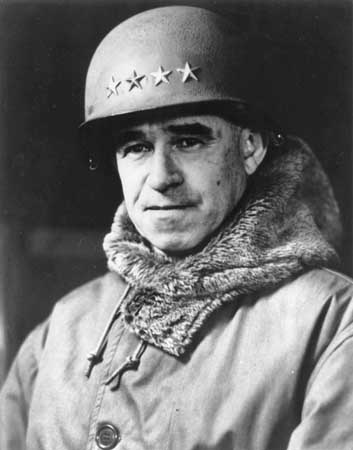American general Along with Generals Dwight D. Eisenhower and George S. Patton, Omar Bradley is considered one of the major Second World War American commanders. Born in Clark, Missouri, on 12 February 1893, he was the son of a schoolteacher father who died young. His mother worked as a seamstress to support the family and send her son to the U.S. Military Academy at West Point, from which he graduated in 1915. He served on the Mexican border, was then posted to Montana, and was disappointed that the 1918 armistice ending World War I arrived before he could serve in Europe. Following the end of the war, Bradley lectured in mathematics at West Point. He attended the general staff school in 1929 and the Army War College in 1934. In 1941, he served as an infantry instructor at Fort Benning, Georgia. He was promoted to the rank of brigadier general in 1941.
When the United States entered the Second World War after the Japanese attack on the naval base at Pearl Harbor in Hawaii, Bradley was named as the commander of the 82nd Infantry Division; later, he was appointed to command the 28th Infantry Division. Early in 1943, he was sent to North Africa, succeeding General George S. Patton as commander of the United States’ II Corps, which he led through the defeat of the Germans in North Africa and the allied invasion of Sicily. He played a key part in the defeat of the Germans on 7–9 May 1943 at Tunis and Bizerte (also called Bizerta), part of the dual American and British action called Operation Torch.
For his service in North Africa, Bradley was promoted to lieutenant general in June 1943 and awarded the Distinguished Service Medal. In autumn 1943, he was transferred to London and named by the Allied commander General Dwight D. Eisenhower to become commander of U.S. ground forces in Europe. His first practical test in this role came on 6 June 1944, when American, British, and other Allied troops stormed the beaches of Normandy, France, in Operation Overlord, better known as D-Day. Bradley’s troops landed on the beaches codenamed Omaha and Utah. When the attack on Omaha beach became bogged down with terrible American casualties, Bradley briefly considered withdrawal, but his men held their ground and eventually achieved their objectives, making the landings a tremendous success. Bradley’s leadership of the First Army is widely considered to have made the difference in the successful Allied advance toward the east from northern France. The inclusion of troops from Patton’s Third Army allowed Bradley to form the 12th Army Group, of which he became commander, and he was present when American forces liberated Paris on 25 August 1944.
On 12 March 1945, shortly before the end of the war, Bradley was given a fourth star. He was one of the leaders who coordinated the allied rout of the German army, crossing the Rhine River at the captured bridge at Remagen and eventually halting at Pilsen in Czechoslovakia as the war ended. Historians speculate that Bradley, in command of some 1.2 million troops, could have taken Berlin had the Soviet army not done so first.
From 1945 until 1947, Bradley acted as the interim administrator of the Veterans Administration, later to become the cabinet-level Department of Veterans Affairs. On 7 February 1948, he succeeded Eisenhower as chief of staff of the U.S. Army, serving until 16 August 1949. On that same day, he was named chairman of the Joint Chiefs of Staff, the head of all U.S. armed services. He also served as the first chairman of the Military Committee of the North Atlantic Treaty Organization (NATO) from 1949 to 1950. Bradley was given a fifth star in September 1950, earning the title General of the Army. His memoirs, A Soldier’s Story, were published in 1951. He retired from active duty in August 1953, going to work for the Bulova Watch Company and rising to become chairman of the board in 1958. After his death in New York City on 8 April 1981, age 88, he was laid to rest with full military honors in Arlington National Cemetery in Virginia. His stone simply reads: “Omar Nelson Bradley. General of the Army.”
Historians contrast Bradley’s mild demeanor with that of his fellow American, George S. Patton. Historian James Lucas writes, “Bradley was a quiet spoken, well-mannered man, who, having given an order, expected it to be carried out thoroughly and swiftly without his interference. Nor did he welcome interference from his superiors. Once he had been given a job, he would carry it out. He needed no supervision. Because of his reluctance to interfere with a subordinate’s operations, he at times seemed not to exercise sufficient control over Patton— but that was Bradley’s way. His aim was to teach by example, a reflection of the early days when he lectured at West Point. Quiet, dependable, an excellent administrator and a sound tactician—this was Omar Bradley.”
References: Bradley, Omar Nelson, A General’s Life: An Autobiography (New York: Simon and Schuster, 1983); “Bradley, Omar N.,” in Command: From Alexander the Great to Zhukov—The Greatest Commanders of World History, edited by James Lucas (London: Bloomsbury Publishing, 1988), 194–195; Windrow, Martin, and Francis K. Mason, “Bradley, Omar,” in The Wordsworth Dictionary of Military Biography (Hertfordshire, U.K.: Wordsworth Editions Ltd., 1997), 36–37; North Brace, “Bradley, Omar Nelson,” in Encyclopedia of American War Heroes (New York: Checkmark Books, 2002), 25.
